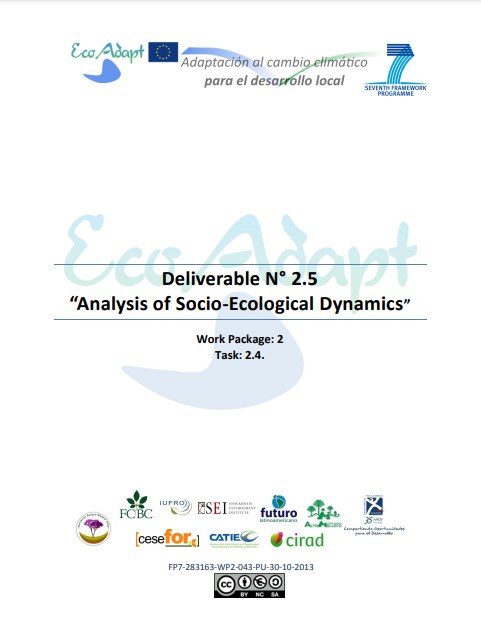Ecosystem-based strategies and innovations in water governance networks for adaptation to climate change in Latin American Landscapes: Deliverable N° 2.5" Analysis of Socio-Ecological Dynamics". Work Package: 2 Task: 2.4.
Bosque Modelo:
Chiquitano
Temática:
Cambio climático
Tipo de documento:
Informe técnico
Resumen
The analysis of socio-ecological dynamics (T2.4) is the last activity of the WP2 “Filling knowledge gaps about the context”. This activity aims at developing information and knowledge about the dynamics and the functioning of the Socio-Ecological System (SES) in each of the project sites; exploring the interactions between human society and the ecosystem, defining the drivers that explain those dynamics and proposing some representations (conceptual models) which pave the way for further modelling, scenario building and simulation phase of the project (WP3). Due to delays in the implementation in the other tasks of WP2; the field activities dedicated to the analysis of the SES were carried out in the project sites starting in April 2013. Nevertheless, thanks to a strong commitment of local teams and students; T2.4 was fulfilled in October 2013, which represents a very slight delay comparing with original schedule for September 2013. T2.4 was implemented in 3 phases. The first phase consisted in the concerted definition of a methodology within a dialogue between the researcher team and each Model Forest (MF, BM in Spanish) team, a Civil Society Organization (CSO). This dialogue began during the workshop of Conception (May 2012) and led to choose as core method, the Problematic-Actors-ResourcesDynamics-Interactions (PARDI) method. It was adjusted according to the specific demand, situation and configuration of the project sites: the whole BMJ site in Argentina, the pilot BMCh site in Bolivia, and the two BMAAM sites in Chile. The second phase consisted in the implementation in each territory. After the definition and formulation of a shared problematic of the territory; actors and resources linked to this problematic were identified, mobilizing knowledge of MF staff and local stakeholders. Then, though specific workshops and/or interviews to direct and indirect actors of the SES, the interactions between actors and resources, as well as dynamics that affect these interactions were characterized systematically. Finally, a representation of the SES functioning was built by iteration within a dialogue between researchers, MF staff and local stakeholders. A set of integrated conceptual models and submodels focusing on one part of the problematic or an issue, was built in each of the three territories. This active phase of field activities led to the redaction of three specific reports: Rixen et al., 2013; Aguilar et al., 2023; and Vilugrón et al., 2013, respectively for Jujuy MF, Chiquitano MF and Araucarias de Alto Malleco MF. The third phase consisted in a transversal analysis and synthesis of the three SES analysis conducted in parallel in the T.2.4. Deliverable 2.5 presents here this synthesis.
Información Bibliográfica
Autor:
Jean-François Le Coq, Abigaïl Fallot
Año:
2013
País :
Bolivia
Páginas:
-
Idioma:
Ingles
Palabras claves
Socio-ecological system, dynamics, participatory modelling, water management, stakeholders practices, climate change





